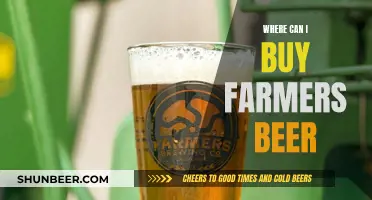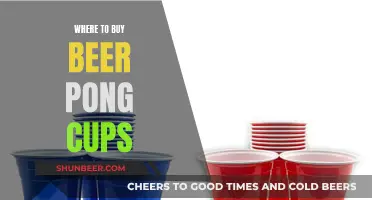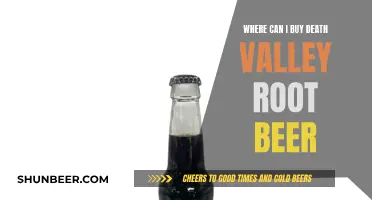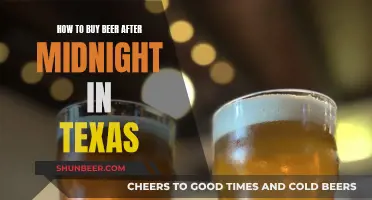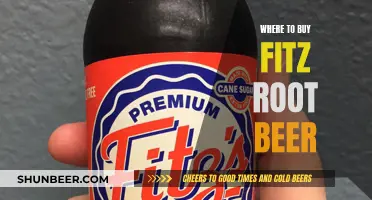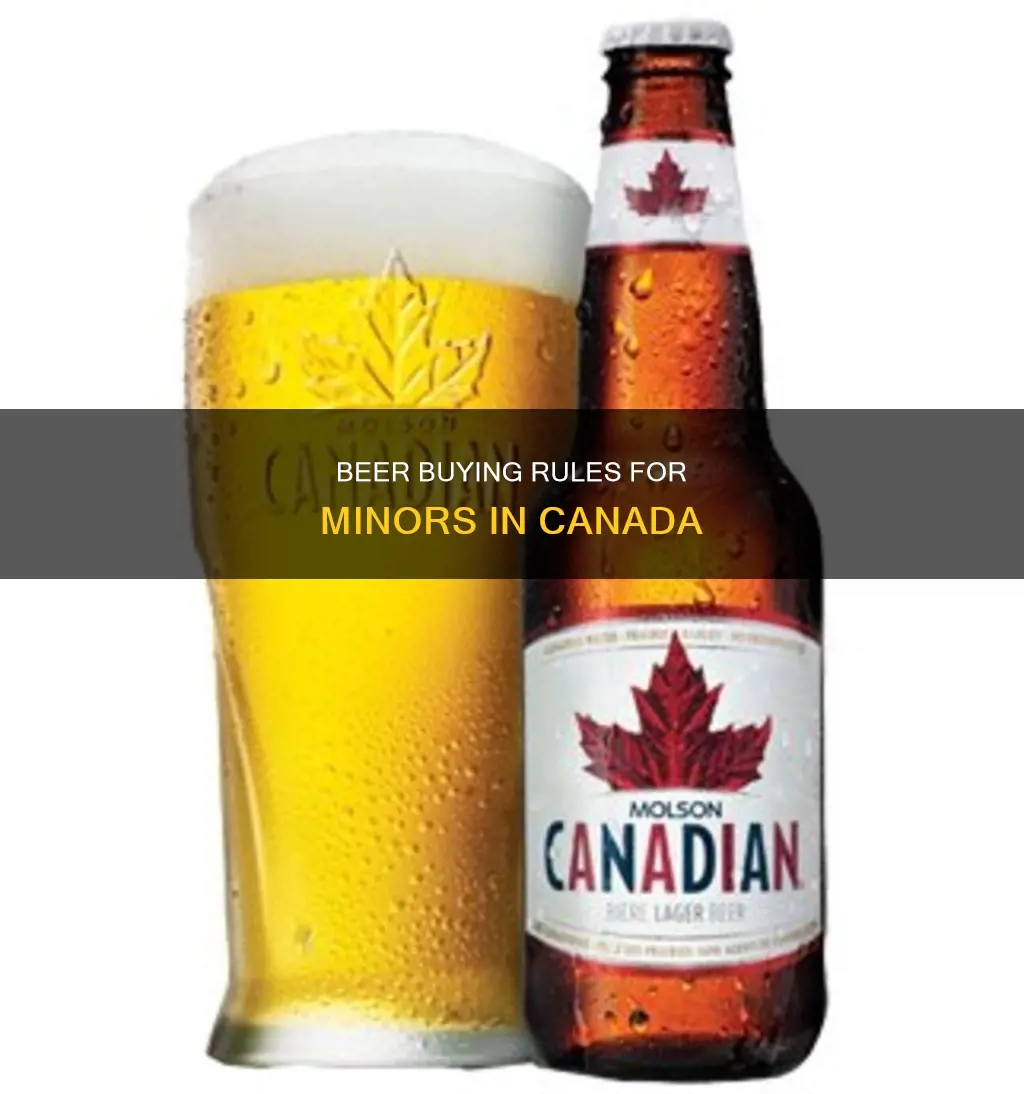
In Canada, the legal drinking age varies by province, with most provinces requiring individuals to be at least 18 years old to purchase and consume alcohol. However, some provinces, such as Alberta, Quebec, and Manitoba, allow underage drinking under the supervision of parents or guardians in their residence. Licensed establishments are prohibited from serving alcohol to minors, and the penalty for doing so varies across provinces. While non-alcoholic beer may be an option for minors in some countries, each province in Canada sets its own rules regarding the sale and consumption of alcohol, including non-alcoholic beverages. Therefore, it is essential to refer to the specific regulations in each province to determine whether minors can legally buy beer in Canada.
| Characteristics | Values |
|---|---|
| Drinking age in Canada | 18 in Alberta, Quebec and Manitoba; 19 in Ontario and British Columbia |
| Drinking age in licensed establishments | 18 in some provinces/territories; 19 in others |
| Minors drinking in licensed establishments | Not allowed |
| Minors drinking with parents/guardians | Allowed in some provinces |
| Minors drinking in private residences | Allowed in some provinces |
| Minors drinking and driving | Not allowed |
| Minors drinking non-alcoholic beer | No age limit |
What You'll Learn

Minors drinking in licensed establishments
In Canada, it is illegal for licensed establishments to serve alcohol to minors. The age of majority, which is the legal drinking age, varies across provinces and territories: in some, it is 18, while in others, it is 19. For example, in British Columbia, where the legal drinking age is 19, a first contravention of serving a minor may result in a 10-day licence suspension or a $10,000 fine. In Alberta, the legal drinking age is 18, and it is an offence for anyone under 18 to possess, consume, or purchase alcohol.
Penalties for licensed establishments serving alcohol to minors vary across Canada. In British Columbia, licensees who operate businesses where liquor is served face penalties ranging from $7,500 to $10,000, or a 10-15 day suspension for minors being served in their establishments. In Alberta, if someone buys a minor alcohol, they can be fined up to $2,000.
In Ontario, the Liquor Licence Act states that people under the age of 19 can consume alcohol only if it is supplied by their parent or legal guardian and consumed in their presence. Similar rules apply in other provinces. For instance, in British Columbia, minors are permitted in restaurants at any time and do not need to be accompanied by a parent or guardian, but they may not be served liquor. They may enter restaurant lounges when accompanied by an adult but still may not be served liquor. Minors who are 16 or older may serve liquor in restaurants but may not open bottles, pour, or mix drinks.
It is important to note that provinces have their own guidelines, and penalties for offences involving minors and alcohol can be more severe than federal guidelines.
Buying Beer at Brew Detroit: What You Need to Know
You may want to see also

Minors drinking and driving
In Canada, the legal drinking age varies by province, with most provinces setting it at 18 years, and others at 19 years. Underage drinking is nevertheless prevalent, with the average age of first alcohol use at 13 years. Close to 80% of Canadians aged 15 and above have reported drinking in the past year.
The Criminal Code prohibits anyone from operating a motor vehicle, vessel, aircraft, or railway equipment while impaired by alcohol or drugs. This is a serious offence that can result in charges, fines, and even imprisonment. The penalties for impaired driving vary across Canada, but they are often severe, especially for minors.
Minors who are convicted of impaired driving may face a one-year driving ban, probation with conditions such as alcohol counselling, or community service hours. A conviction can also impact their graduated driver's licence, as most provinces require novice drivers to have zero alcohol in their system. Additionally, the cost of car insurance will significantly increase upon conviction.
In Alberta, for example, drivers under the age of 18 cannot have any alcohol in their system while driving. The Alberta Traffic Safety Act imposes strict rules on drivers in the graduated licensing program, regardless of their age. Similar laws and penalties exist in other provinces as well.
The consequences of minors drinking and driving can be significant, affecting their driving privileges, insurance costs, and even resulting in criminal charges. It is essential for young people to understand the risks and legal implications associated with impaired driving to make informed and safe choices.
Spotted Cow Beer: Illinois Availability and Where to Buy
You may want to see also

Minors drinking non-alcoholic beer
In Canada, the legal drinking age varies by province, with most provinces setting it at 18 and others at 19. In some provinces, such as Alberta, Quebec, and Manitoba, underage drinking is permitted for younger teens as long as it is done under parental supervision in their residence. However, it is illegal to purchase liquor for a minor across the country.
Now, let's focus on the topic of minors drinking non-alcoholic beer. While the laws regarding minors and alcohol in Canada are clear, the situation with non-alcoholic beverages is more nuanced. Non-alcoholic beer, by definition, contains less than 0.5% alcohol by volume (ABV). In the United States, the laws vary from state to state. In some states, minors are prohibited from purchasing non-alcoholic beer, while in others, it is not regulated or allowed under certain conditions. For example, in Ohio, minors must be over 18 to purchase non-alcoholic beer. On the other hand, some states like Oregon, West Virginia, and Wyoming restrict the purchase of non-alcoholic beer by those under 21 for beverages with 0.5% ABV or higher.
The situation in Canada may be similar, with provinces having different regulations regarding non-alcoholic beer for minors. While non-alcoholic beer contains only trace amounts of alcohol, it is still regulated by alcohol-related laws in some places. Therefore, it is essential to check the local and provincial laws in Canada to understand the specific regulations.
Ultimately, the decision to allow minors to drink non-alcoholic beer rests with the parents or guardians, who should consider the local laws and any potential effects on the minors' future relationship with alcohol.
Arizona's Election Day: Beer Buying Rules Explained
You may want to see also

Minors drinking at home
In Canada, the legal drinking age is 18 in some provinces and territories, and 19 in others. However, in provinces like Alberta, Quebec, and Manitoba, underage drinking is permitted for younger teens as long as it is done under the supervision of their parents or guardians in their residence.
In Ontario, the Liquor Licence Act states that people under the age of 19 can consume alcohol only if it is supplied by their parent or legal guardian and consumed in their presence. While it is illegal to serve alcohol to minors in Ontario, the Liquor Licence Act does allow parents to serve their children inside the family home. Additionally, as long as they are not being served, the Act does not prohibit other minors from drinking inside the home.
Despite the legality of minors drinking at home under parental supervision in certain provinces, it is important to be aware of the potential risks and consequences. Firstly, allowing minors to drink at home may create a sense of approval around breaking the law, which could lead to further problems down the road. Secondly, there is a potential for civil litigation if something goes wrong. Insurance Board of Canada spokesperson Pete Karageorgos warns that hosts may be held liable for any injuries or accidents that occur as a result of alcohol consumption on their property. This includes any injuries suffered by intoxicated minors, whether at the event or after they leave.
To minimize risks when serving alcohol to minors at home, it is important for parents to follow certain guidelines. These include serving sensibly by monitoring alcohol consumption, arranging for designated drivers, serving food to curb alcohol absorption, and limiting the guest list to maintain control over the party. It is also crucial for parents to be aware of their province's specific laws and regulations regarding underage drinking, as penalties for offences involving minors and alcohol vary across Canada.
Modelo Beer: Is It Available in Canada?
You may want to see also

Minors drinking in public
In Canada, the legal drinking age is 18 in some provinces and territories, and 19 in others. In provinces such as Alberta, Quebec, and Manitoba, underage drinking is permitted for younger teens as long as it is done under the supervision of their parents or guardians in their residence.
In Ontario, the Liquor Licence Act states that people under the age of 19 can consume alcohol only if it is supplied to them by their parent or legal guardian and consumed in their presence. Similar rules apply in other provinces. However, it is important to note that licensed establishments are never allowed to serve alcohol to minors. The penalty for doing so varies by province. For example, in British Columbia, where the legal drinking age is 19, a first contravention of serving a minor can result in a 10-day licence suspension or a $10,000 fine.
In Alberta, the Gaming, Liquor, and Cannabis Act controls alcohol sales at bars, restaurants, and liquor stores. It is an offence for anyone under 18 to possess, consume, or purchase alcohol. It is also illegal to sell or supply alcohol to anyone unless the purchaser is a guardian or parent, and it is done at home. If someone buys alcohol for a minor, they could face fines of up to $2,000 in Alberta. Minors found in a licensed establishment may have to pay a $200 fine.
It is illegal to have an open bottle of liquor in a public place and to be intoxicated in public in Canada. If caught breaking these laws, a person may receive a ticket, with amounts varying depending on the incident but typically around $70 for a first offence.
Social hosts who provide alcohol to underage youth may be held liable for any alcohol-related injuries that occur on their property or elsewhere under their control. This includes events where guests bring their own alcohol and serve themselves (BYOB). The courts are likely to be even more critical if the host bought or provided the alcohol for the underage event.
Using Walgreens Gift Cards to Purchase Beer Legally
You may want to see also
Frequently asked questions
The legal drinking age in Canada varies across provinces. In most of the country, a person can buy and drink alcohol at the age of 18. However, in provinces such as Alberta, Quebec, and Manitoba, underage drinking is allowed for younger teens as long as it is done under the supervision of parents or guardians in their residence.
Minors cannot buy beer in Canada. Licensed establishments are never allowed to serve alcohol to minors. The penalty for doing so varies by province. For example, a first contravention of serving a minor is a 10-day license suspension or a $10,000 fine in British Columbia, where the legal drinking age is 19.
In provinces such as Alberta, Quebec, and Manitoba, underage drinking is allowed for younger teens as long as it is done under the supervision of parents or guardians in their residence. In Ontario, people under the age of 19 can consume alcohol only if it is supplied to them by their parent or legal guardian and consumed in their presence. Similar rules apply in other provinces.
No, minors cannot drive after drinking in Canada. Under s.320.14(1) of the Criminal Code, anyone who operates a motor vehicle, vessel, aircraft, or railway equipment while their ability is impaired by alcohol or drugs can face charges and a fine of up to $1,000.


